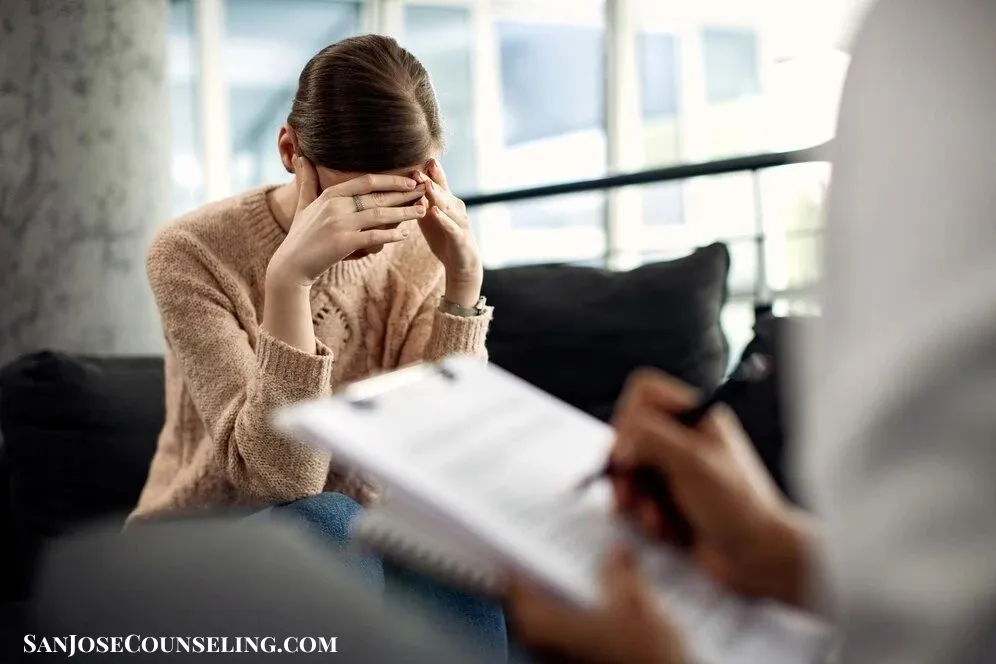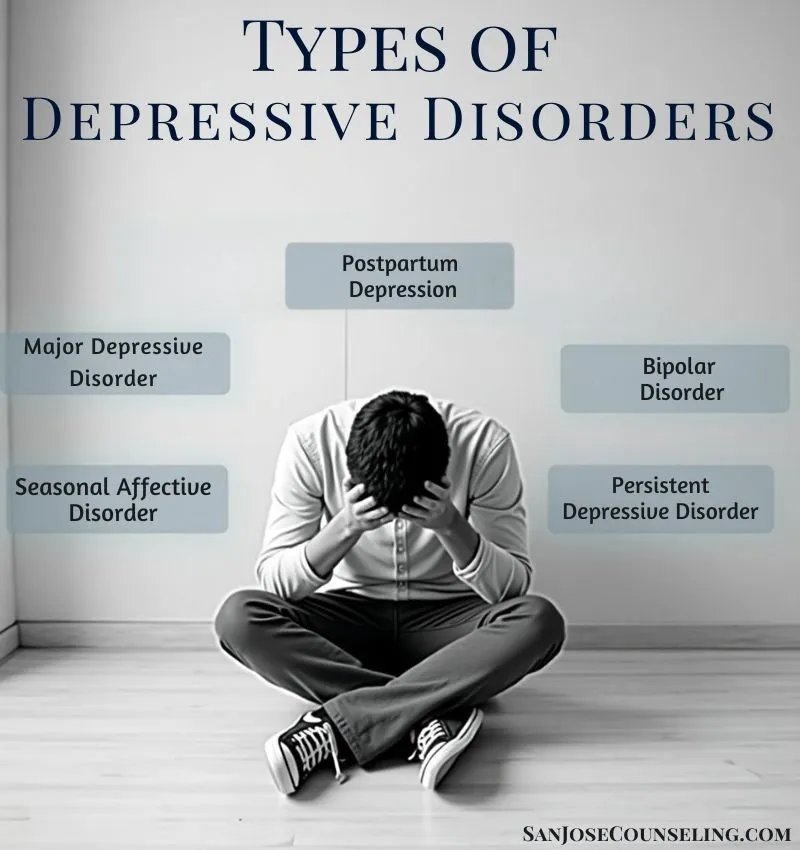Other Services
1- Individual Therapy
2- Couples and Marriage Counseling
3- Christian Counseling
4- Families
Seek Counseling & Therapy
Online Depression Therapy and Counseling, San Jose California

What is Depression?
Moods beyond sadness define depression, as it creates an excessive burden for completing basic activities. Depression affects a person's feelings, along with their thinking abilities and vitality levels, together with how they interact with others and their general state of wellness.
You do not need to handle your consistent feelings of sadness, hopelessness, or emotional emptiness independently because support exists for your situation.
The National Institute of Mental Health (NIMH) reports that depression touches 16% of U.S. adults at some stage throughout their lives.
People can develop depression anytime, yet the condition commonly arises when they have faced major life transitions accompanied by significant stress.
People suffering from depression can recover their hope through appropriate support systems and therapeutic methods.
Book your free consultation with Dr. Invia A. Betjoseph (depression therapist and counselor in California) to begin living a better life.
Talk to Dr. Invia — licensed Marriage & Family Therapist.

Types of Depressive Disorders

- Major Depressive Disorder: Persistent low mood, loss of interest in daily activities.
- Postpartum Depression: Creates major mental and physical health problems for new mothers.
- Bipolar Disorder: The condition produces severe changes in mood along with depressive periods.
- Persistent Depressive Disorder (Dysthymia): This form of depression persists throughout multiple years with less severe symptoms.
- Seasonal Affective Disorder (SAD): Many people develop depression due to seasonal variations that typically appear during winter months.
Recognizing the Signs of Depression
Getting to know the specific indicators of depression represents the initial milestone in the healing process. Common signs include:
- Appetite fluctuations, weight gain, or weight loss.
- Feelings of worthlessness, excessive guilt, or self-criticism.
- Fatigue, low energy, or unexplained physical aches and pains.
- Irritability, restlessness, or withdrawal from family and friends.
- Persistent feelings of sadness, hopelessness, or emotional numbness.
- Activities that used to bring joy no longer give pleasure to the person.
- The inability to concentrate alongside problems in making choices and problems with memory function.
- Sleep problems that lead to insomnia and excessive periods of sleep or non-sleep occur during persistent feelings of sadness.
Physical Symptoms
- Decreased energy and motivation.
- Insomnia or excessive sleeping.
- Changes in appetite or weight.
- Unexplained aches and pains.
Psychological Symptoms
- The need for immediate medical help exists for individuals experiencing thoughts about self-harm or suicide (such as hospital admission procedures).
- Feelings of worthlessness or guilt.
- Self-criticism or excessive guilt.
- Difficulty making decisions.
Our Evidence-Based Approach to Depression Therapy
People usually experience depression when biological factors blend with psychological elements, alongside environmental triggers.
Our therapy uses established therapeutic methods to treat the core reasons behind depression.
- Mindfulness-Based Therapy: Cultivate awareness and presence to reduce stress and emotional overwhelm.
- Behavioral Activation: Meaningful activities should be reintroduced as a method to bring back daily life motivation and pleasure.
- Cognitive Behavioral Therapy (CBT): Detects and transforms negative thoughts, which plays a role in the development of depression.
- Building Healthy Routines: An individual must establish healthier sleep routines, along with better exercise and nutrition habits for emotional stability.
- Strengthening Social Support: Developing better relational connections and improved communication strategies leads to improved interpersonal connection.
- Trauma-Informed Therapy: Current emotional health requires exploration of previous experiences that continue to affect it.
- Eye Movement Desensitization and Reprocessing (EMDR)
- Internal Family Systems (IFS)
- Self-Compassion and Acceptance Strategies: Developing self-compassion instead of self-condemnation is a key component in fostering emotional healing and long-term recovery from depression.
Related: When to Walk Away from Someone with Mental Illness?
The Benefits of Therapy for Depression
By engaging in therapy, individuals can experience:
- Stronger relationships through better communication and emotional connection.
- Greater self-awareness and resilience against future stress.
- Healthier thinking patterns and reduced self-criticism.
- Improved emotional balance and more stable moods.
- Renewed motivation and purpose in daily activities.
- A more positive and hopeful outlook on life.
Most Common Causes of Depression
Depression can result from several factors, including:
- Genetics: A family history of depression may increase your risk.
- Life events: Stress, trauma, or changes in life tend to initiate depressive periods.
- Chronic illness: Patients with diabetes or heart diseases often show signs of depressive symptoms.
- Biological factors: Brain chemicals, together with hormones and inflammation, play some role in the process.
- Social factors: Lack of support, together with isolation and poor relationships, can make people more susceptible to depression.
5 Steps to Manage and Get Rid of Depression.
- Seek Professional Help: The combination of treatment strategies including CBT and psychotherapy together with medication demonstrates effectiveness for different patients.
- Practice Mindfulness and Self-Care: Symptoms become more manageable with exercises in mindfulness together with structured health routines.
- Exercise Regularly: Physical activity is known to improve mood and energy.
- Build a Support System: Surround yourself with supportive friends, family, and community.
- Stay Consistent with Treatment: The success rate of lasting recovery increases when patients take their medications, alongside regular attendance at therapy sessions.
Depression Therapy and Counseling in San Jose, California
Depression creates heavy burdens, which seem impossible to remove when you are going through it. You don't need to go through this difficult depression by yourself.
The therapists at our San Jose location provide individualized care to support patients through depression challenges according to their personal needs.
Our therapies, including CBT, alongside EMDR, help analyze and restructure both negative thought patterns and sources of emotional stress.
Health care through therapy exists as much more than applied techniques because patients obtain direction using therapeutic conversations with listening practitioners.
Everyone experiences depression in a unique manner, since its symptoms differ from one person to another. You feel stuck, unmotivated, and disconnected from the things that once made you happy. You create a false appearance that everything is good while inside you genuinely feel different. We assist anyone needing help without consideration of their current healing stage.
Dr. Invia A. Betjoseph can accessed online for depression therapy at ‘San Jose Counseling.’Book your free consultation with him and begin your path towards better wellbeing.
Related: Partner Betrayal Trauma Therapy.
FAQ - Depression Therapy and Counseling.
How Long Does Depression Last?
Each person experiences depression at different lengths. Different people endure depression for either short or extended periods of time.
Therapy sessions help patients’ better handle symptoms, while decreasing their severity, which results in better emotional strength.
Does Depression Therapy or Counseling Work?
Yes, therapy offers an effective method to handle depression symptoms while helping patients reduce their severity.
The appropriate therapy approaches, including CBT or psychotherapy, enable clients to build new coping skills, which lead to a balanced fulfilling existence.
What Does Depression Treatment Include?
Patients benefit from therapy methods that combine psychotherapy with behavioral approaches and mindfulness practices, as well as the possibility of getting medicines.
Treatment intends to handle both emotional symptoms, as well as root depression causes.
How Can Professional Help Bring True Change in Life?
A therapeutic relationship gives patients the necessary strategies to both transform their unhealthy thinking patterns and build stable emotional management techniques, leading to enhanced recovery.
Professional guidance enables people to achieve sustainable mental and personal growth in their thoughts and health.
How Long Does Depression Therapy Take?
Development of therapy duration depends directly on both clients' requirements, along with their established treatment objectives.
Clients normally show improvement in their condition starting from a few weeks to a few months, before needing continued support for sustained success.


